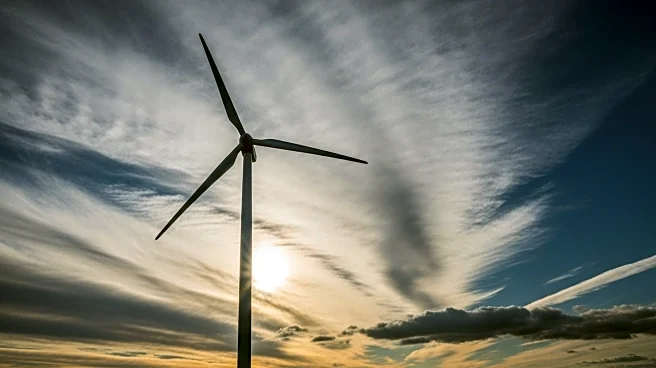What's Happening?
Equinor ASA, a Norwegian energy company, has announced its commitment to support Ørsted A/S's share sale by investing nearly $1 billion. This move comes as Ørsted seeks to stabilize its financial standing following challenges posed by the Trump administration's opposition to offshore wind projects. Equinor, which holds a 10% stake in Ørsted, plans to subscribe for up to 6 billion Danish kroner ($940 million) of new shares. This backing is crucial for Ørsted as it aims to secure broader investor support for a proposed 60 billion-krone ($9.4 billion) capital raise. Despite the U.S. administration's halt on Ørsted's Revolution Wind project, Equinor remains committed to its green agenda and sees potential for closer collaboration with Ørsted.
Why It's Important?
Equinor's support is significant as it underscores the resilience of the offshore wind sector amidst political challenges in the U.S. The Trump administration's actions have created uncertainty for Ørsted's projects, impacting investor confidence and stock value. Equinor's investment not only provides financial backing but also signals confidence in Ørsted's business model and future prospects. This development could influence other investors and stakeholders in the renewable energy sector, highlighting the importance of strategic partnerships in overcoming regulatory and political hurdles. The move also reflects Equinor's commitment to sustainable energy, potentially setting a precedent for other oil majors to follow suit.
What's Next?
The collaboration between Equinor and Ørsted may lead to further strategic partnerships or increased stakes in the future. Equinor's continued support could pave the way for potential mergers or acquisitions, enhancing both companies' positions in the renewable energy market. As Ørsted navigates the challenges posed by the U.S. administration, it may explore new business models and consolidation opportunities within the industry. Stakeholders will be closely monitoring the political landscape and its impact on offshore wind projects, as well as any shifts in investor sentiment following Equinor's backing.
Beyond the Headlines
This development highlights the broader implications of political influence on renewable energy projects. The Trump administration's stance on offshore wind underscores the challenges faced by the industry in securing consistent policy support. Equinor's decision to back Ørsted despite these challenges reflects a strategic bet on the long-term viability of renewable energy. This situation may prompt discussions on the need for stable regulatory frameworks to support the transition to sustainable energy sources, emphasizing the role of international partnerships in achieving climate goals.










